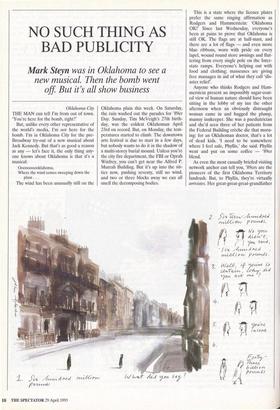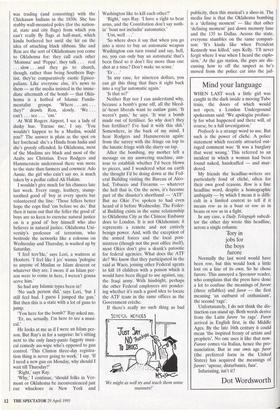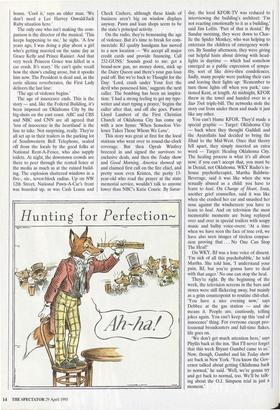NO SUCH THING AS BAD PUBLICITY
Mark Steyn was in Oklahoma to see a
new musical. Then the bomb went off. But it's all show business
Oklahoma City THE MAN can tell I'm from out of town. `You're here for the bomb, right?'
But, unlike every other representative of the world's media, I'm not here for the bomb. I'm in Oklahoma City for the pre- Broadway try-out of a new musical about Jack Kennedy. But that's as good a reason as any β let's face it, the only thing any- one knows about Oklahoma is that it's a musical:
O00000000klahoma, Where the wind comes sweeping down the plain . . .
The wind has been unusually still on the Oklahoma plain this week. On Saturday, the rain washed out the parades for '89er Day. Sunday, Tim McVeigh's 27th birth- day, was the coldest Oklahoman April 23rd on record. But, on Monday, the tem- peratures started to climb. The downtown arts festival is due to start in a few days, but nobody wants to do it in the shadow of a multi-storey burial mound. Unless you're the city fire department, the FBI or Oprah Winfrey, you can't get near the Alfred P. Murrah Building. But it's up into the six- ties now, pushing seventy, still no wind, and two or three blocks away we can all smell the decomposing bodies. This is a state where the licence plates prefer the same ringing affirmation as Rodgers and Hammerstein: 'Oklahoma OK!' Since last Wednesday, everyone's been at pains to prove that Oklahoma is still OK. The flags are at half-mast, and there are a lot of flags β and even more blue ribbons, worn with pride on every lapel, wound round store awnings and flut- tering from every single pole on the Inter- state ramps. Everyone's helping out with food and clothing; masseuses are giving free massages in aid of what they call 'dis- aster relief.
Anyone who thinks Rodgers and Ham- merstein present an impossibly sugar-coat- ed view of human nature should have been sitting in the lobby of my inn the other afternoon when an obviously distraught woman came in and hugged the plump, mumsy innkeeper. She was a paediatrician and she'd seen three of her patients from the Federal Building crΓ¨che die that morn- ing: for an Oklahoman doctor, that's a lot of dead kids. 'I need to be somewhere where I feel safe, Phyllis,' she said. Phyllis went and put on some coffee β '89er blend.
As even the most casually briefed visiting network anchor can tell you, '89ers are the pioneers of the first Oklahoma Territory landrush. But, to Phyllis, they're virtually arrivistes. Her great-great-great-grandfather was trading (and consorting) with the Chickasaw Indians in the 1850s. She has stubby wall-mounted poles (for the nation- al, state and city flags) from which you can't really fly flags at half-mast, which kinda bothered her until she hit on the idea of attaching black ribbons. She and Ron are the sort of Oklahomans you come to Oklahoma for: they call each other `Momma' and 'Poppa', they talk . . . real . . . slow . . . and they go to church, though, rather than being Southern Bap- tist, they're comparatively exotic Episco- palians. Like everyone else, it's news to them β as the media insisted in the imme- diate aftermath of the bomb β that Okla- homa is a hotbed of Islamic Funda- mentalist groups. 'Where . . . are . . . they?' drawls Ron, slowly. 'We . can't . . . see . . . 'em.'
At Will Rogers Airport, I see a lady of dusky hue. 'Excuse me,' I say. 'You wouldn't happen to be a Muslim, would you?' The answer is plain as the spot on her forehead: she's a Hindu from India and she's grossly offended. In Oklahoma, most of the Muslims are black and most of the Arabs are Christian. Even Rodgers and Hammerstein understood there was more to the state than farmers and cowmen: Ado Annie, the girl who cain't say no, is much taken by a pedlar called Ali Hakim.
I wouldn't give much for his chances late last week. Every rangy, leathery, stump- toothed good ol' boy at every sports bar volunteered the line: 'Those fellers better hope the cops find 'em before we do.' But then it turns out that the feller the good ol' boys are so keen to exercise natural justice on is a good or boy himself who also believes in natural justice. Oklahoma Uni- versity's professor of terrorism, who bestrode the networks like a colossus on Wednesday and Thursday, is washed up by Saturday.
`I feel terr'ble,' says Lori, a waitress at Hooters. 'I feel like I jes' wanna 'pologise to anyone of Muslim or Islam descent or whatever they are. I swore if an Islam per- son were to come in here, I weren't gonna serve him.'
So had any Islamic types been in?
`No such person did,' says Lori, 'but I still feel bad. I guess I jumped the gun.' But then this is a state with a lot of guns to jump.
`You here for the bomb?' Ray asked me. `Er, no, actually. I'm here to see a musi- cal.'
He looks at me as if I were an Islam per- son. But Ray's in for a surprise: he's sitting next to the only fancy-pants faggoty musi- cal comedy ass-wipe who's opposed to gun control. 'This Clinton three-day registra- tion thing is never going to work,' I say. 'If I need a new gun on Monday, why should I wait till Thursday?'
`Right,' says Ray.
`Why,' I continue, 'should folks in Ver- mont or Oklahoma be inconvenienced just cuz whackoes in New York and Washington like to kill each other?'
`Right,' says Ray. 'I have a right to bear arms, and the Constitution don't say noth- in"bout not includin' automatics.'
`Um, well . .
`So where does it say that when you go into a store to buy an automatic weapon Washington can turn round and say, hell, no, you can only buy an automatic that's been fixed so it don't fire more than one shot at a time? Don't make no sense.'
`Er . .
`In any case, fer nineteen dollars, you can git this thing that fixes it right back into a reg'lar automatic again.'
'Is that so?'
Neither Ray nor I can understand why, because a bomb's gone off, all the bleed- in'-heart liberals want to outlaw guns. 'It . weren't guns,' he says. 'It wuz a bomb made out of fertiliser. So why don't they ban fertiliser? I've had it with this shit.' Somewhere, in the back of my mind, I hear Rodgers and Hammerstein again: from the surrey with the fringe on top to the lunatic fringe with the slurry on tap.
After the bombing, my mother left a message on my answering machine, anx- ious to establish whether I'd been blown to pieces, and I wondered what on earth she thought I'd be doing down at the Fed- eral Building visiting the Bureau of Alco- hol, Tobacco and Firearms β whatever the hell that is. On the news, it's become part of the disaster's shorthand β 'ATF'. But no Okie I've spoken to had even heard of it before Wednesday. The Feder- al Building exists in the same relationship to Oklahoma City as the Chinese Embassy does to London. It is not Oklahoman; it represents a remote and not entirely benign power. And, with the exception of the armed forces and the local post- mistress (though not the post office itself), most Okies don't give a skunk's patootie for federal agencies. What does the ATF do? We know that they participated in the raid at Waco, joining other Federal agents to kill 18 children with a poison which it would have been illegal to use against, say, the Iraqi army. With hindsight, perhaps the other Federal employees are ponder- ing whether it's such a good idea to locate the ATF team in the same offices as the Government crΓ¨che.
If there's really no such thing as bad `We might might as well try and teach them some manners!' publicity, then this musical's a shoo-in. The media line is that the Oklahoma bombing is a 'defining moment' β like that other `defining moment' just down memory lane and the 135 to Dallas. Across the state, everyone stumbles on the same compari- son: 'It's kinda like when President Kennedy was killed,' says Kelly. never fergit where I wuz when I heard the explo- sion.' At the gas station, the guys are dis- cussing how to off the suspect as he's moved from the police car into the jail- house. `Cool it,' says an older man. 'We don't need a Lee Harvey Oswald/Jack Ruby situation here.'
The only one who isn't making the com- parison is the director of the musical. 'This keeps happening to me,' he sighs. 'A few years ago, I was doing a play about a girl who's getting married on the same day as Grace Kelly and Prince Rainier. And that very week Princess Grace was killed in a car crash. It's scaly.' He can't quite recall how the show's ending arose, but it spooks him now. The President is dead and, as the eerie silence reverberates, the First Lady delivers the last line: `The age of violence begins.'
The age of innocence ends. This is the story β and, like the Federal Building, it's been imposed on Oklahoma City by the big-shots on the east coast. ABC and CBS and NBC and CNN are all agreed that `loss of innocence in the heartland' is the line to take. Not surprising, really. They're all set up in their trailers in the parking lot of Southwestern Bell Telephone, sealed off from the locals by the good folks at National Rent-A-Fence, who also supply toilets. At night, the downtown crowds are there to peer through the rented fence at the media as much as at the ruined build- ing. The explosion shattered windows in a five-, six-, seven-block radius. Up on NW 12th Street, National Pawn-A-Car's front was boarded up, as was Cash Loans and Check Cashers, although these kinds of business aren't big on window displays anyway. Pawn and loan shops seem to be the state's principal activity.
On the radio, they're bemoaning the age of violence. But it's time to break for com- mercials: RJ quality handguns has moved to a new location β 'We accept all major credit cards and provide financing. Call 232-GUNS.' Sounds good to me: get a brand-new gun, no money down, stick up the Dairy Queen and there's your gun loan paid off. But we're back to Thought for the Day: 'Lord, crush under Your feet the devil who possessed him,' suggests the next caller. The bombing has been an inspira- tion: `I had a strong feeling to get my type- writer and start typing a prayer,' begins the caller after that, and off she goes. Pastor Lloyd Lambert of the First Christian Church of Oklahoma City has come up with a new hymn: 'When Senseless Vio- lence Takes Those Whom We Love'.
This story was great at first for the local stations who went over to round-the-clock coverage. But then Oprah Winfrey breezed in and signed the survivors to exclusive deals, and then the Today show and Good Morning, America showed up and claimed first call on the fire chief, and pretty soon even Kristen, the perky 13- year-old who read the prayer at the state memorial service, wouldn't talk to anyone lower than NBC's Katie Couric. By Satur-
Hunting for Perfection-
day, the local KFOR-TV was reduced to interviewing the building's architect: 'I'm not reacting emotionally to it as a building,' said Jim Loftis. 'Part of that is denial.' By Sunday morning, they were down to Char- lie the Spider Monkey, who was helping to entertain the children of emergency work- ers. By Sunday afternoon, they were giving out helpful hints about driving with head- lights in daytime β which had somehow emerged as a public expression of sympa- thy, sort of like drive-thru condolences. Sadly, many people were parking their cars and leaving their lights up: 'Remember to turn those lights off when you park,' cau- tioned Kent, at length. At midnight, KFOR threw in the towel and handed over to a Star Trek triple-bill. The networks stole the story out from under them and made it just like any other.
You can't blame KFOR. They'd made a special graphic β Target: Oklahoma City β back when they thought Gaddafi and the Ayatollahs had decided to bring the Jihad to the Mid-West. Once that theory fell apart, they simply inserted an extra word β Target: Healing Oklahoma City. The healing process is what it's all about now; if you can't accept that, you must be in Denial, not Oklahoma. WKY Radio's in- house psychotherapist, Martha Baldwin- Beverage, said it was like when she was sexually abused as a child: you have to learn to heal. On Change of Heart, Joan, another grief counsellor, said it was like when she crashed her car and smashed her nose against the windscreen: you have to learn to heal. And on television the most memorable moments are being replayed over and over in special trailers with soupy music and ballsy voice-overs: 'At a time when we have seen the face of true evil, we have also seen images of tireless compas- sion proving that . . . No One Can Stop The Heal!'
On WKY, BJ was a lone voice of dissent. `I'm sick of all this psychobabble,' he told Martha. She told him, 'I understand your pain, BJ, but you're gonna have to deal with that anger.' No one can stop the heal.
They're right. By the beginning of the week, the television screens in the bars and stores were still flickering away, but mainly as a grim counterpoint to routine chit-chat. `You have a nice evening now,' says Debbee at the gas station β and she means it. People are, cautiously, telling jokes again. You can't keep up this `end of innocence' thing. For everyone except pro- fessional broadcasters and full-time flakes, life goes on.
`We don't get much attention here,' says Phyllis back at the inn. 'But I'll never forget that this week Bryant Gumbel came to us.' Now, though, Gumbel and his Today show are back in New York. 'You know the Gov- ernor talked about getting Oklahoma back to normal,' he said. 'Well, we're gonna try and get back to normal, too. We'll be talk- ing about the O.J. Simpson trial in just a moment.'




























































 Previous page
Previous page